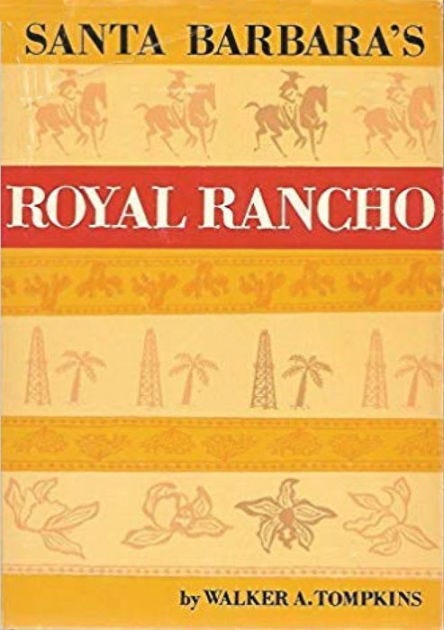"Royal Rancho" by Walter Tompkins review
All the information I wanted about the land where I grew up.
The version of the book that I own wears a recognizable red cover with a yellow stripe bearing Gauchos mounted atop their horses in an all-black silhouette form. It’s the updated version published in 1987. The original book was published in 1960. My family owns many copies of the updated version because Tompkins briefly includes my grandfather at the end of the story.
I know the cover of this book like I know the grooves on the back of my hand. I recall spotting it on various shelves, coffee tables, and dressers throughout my childhood and current home. I knew that it was a book about Dos Pueblos Ranch, the place where I grew up. But, for some reason, it took me 23 years to finally pick it up and read more than the first page.
In 1977, my grandfather purchased 12,800 acres of Dos Pueblos Ranch. For 44 years, my family enjoyed the breathtaking land. Many of us including myself, lived on the land in some of the houses spread throughout the ranch. When I was young, my cousin lived just down the road from me. In those years, the ranch was our ultimate playground.
Walker Tompkins opens the story by transporting the reader hundreds of years back in time with his recount of the Kuyamu and Mikiw Indians. Their story is an essential reminder of the how original inhabitants of the land lived and thrived. For thousands of years, they lived on the bluffs of Dos Pueblos Beach. The same bluffs where I found an arrowhead when I was young. While reading, I often found myself connecting my childhood to the history of the land. “At the water’s edge, Indian cookfires glowed like earth-bound stars in the gathering dusk,” Tompkins writes of Spanish Juan Rodriguez Cabrillo’s account of docking on Dos Pueblos Ranch beach. Tompkins stands out through his ability to make historical writing conversational through dialogue. His rigorous research process is evident in his ability to recount vivid details. At times, I forgot I was indeed reading fact not fiction.
This skill shines when he explores the story of Nicolas Den, the first owner of Dos Pueblos Ranch (Rancho Dos Pueblos). The Irishman acquired 15,535 acres of the land from Governor Juan Alverado through a Mexican land grant. From the beginning, it is clear that Den was drawn to the land, not for its monetary value but for its beauty. “In that case,” he whispered. “I won’t look any further for my future rancho. I’d never be able to find anything to compare with Dos Pueblos,” wrote Tompkins quoting Den’s first time visiting the ranch.
Tompkins succeeds in building an accurate personality and description for each historical figure he introduces. Such descriptions shine through the feud between gang member Jack Powers and Den. Offering a bit of excitement into a historical book. “When Nicolas Den heard the news of Jack Powers’ outrageous attempt to rustle an entire cattle herd, he realized the showdown he had long dreaded could no longer be postponed. If he knuckled under Powers’ hoodlums now, outlawry would have the upper hand for years to come,” writes Tompkins.
Over the years, the ranch saw few owners. Some appreciated the land or its beauty and considered the land a home. Some saw the land as priceless. Others, an opportunity to build. This theme circulated throughout the book. There was a clear distinction throughout history between those who appreciated the land and those who did not
The 1987 version of the book, accurately describes how my grandfather viewed the land, as a caretaker, not an owner. “From the first, I have realized myself to be the appointed guardian and protector, not the owner in perpetuity of Dos Pueblos Ranch,” Tompkins quoted Schulte. After learning about the history of the land, I have a deeper respect for it. I no longer live there anymore, and I haven’t been allowed to visit in two years, but I still consider it my home. “One of the most satisfying things about owning Dos Pueblos Ranch is that my family chooses to live there,” said my grandfather Rudi Schulte to Tompkins.
Rating: 5/5




